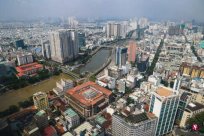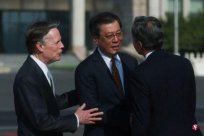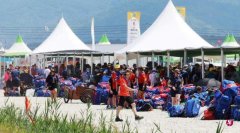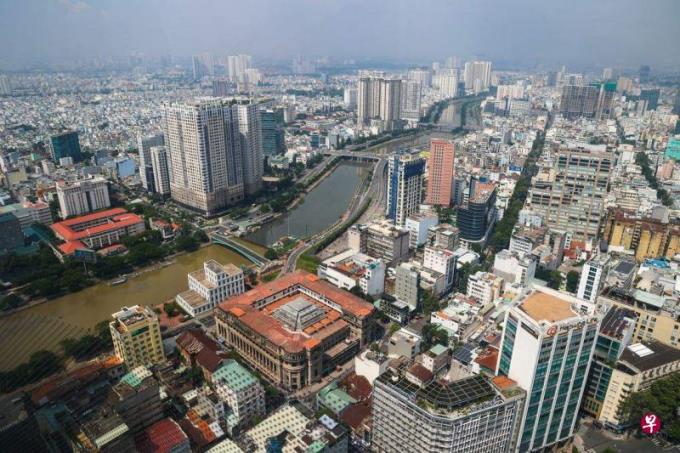
From June 22nd to 24th this year, South Korean President Yin Xiyue conducted a state visit to Vietnam.It is noticeable that there are 205 leaders of the top Korean companies with each other. When the scale exceeds Yin Xiyue's visit to the United States in April, 122 business giants composed of economic delegations.South Korea's attention to Vietnam is obvious.
Yin Xiyue said in a head talks with the Vietnamese President Wu Wenzhan. In the case of the current international situation is very severe and the world is facing a compound crisis, "the close cooperation of Han Yue is more important than any time."
During the visit to Vietnam, in addition to promising to increase its economic development assistance to Vietnam, Yin Xiyue also agreed to accelerate the pace of economic cooperation and strive to achieve the goal of reaching a bilateral trade value of $ 150 billion (about S $ 2014 million) in 2030.The two sides agreed that the two countries' cooperation in the development of Vietnam's rare earth resources huge potential, and agreed to set up a new key mineral supply chain center to lay the foundation of cooperation.
Cui Taiyuan, Speaker of the Korean Commercial and Industry Conference and chairman of SK Group, pointed out at the Korean and Vietnam Business Forum that out of geopolitical considerations, Korean companies are looking for more stable and more trusted partners, and "VietnamIt is the best investment target with efficiency and stability. "
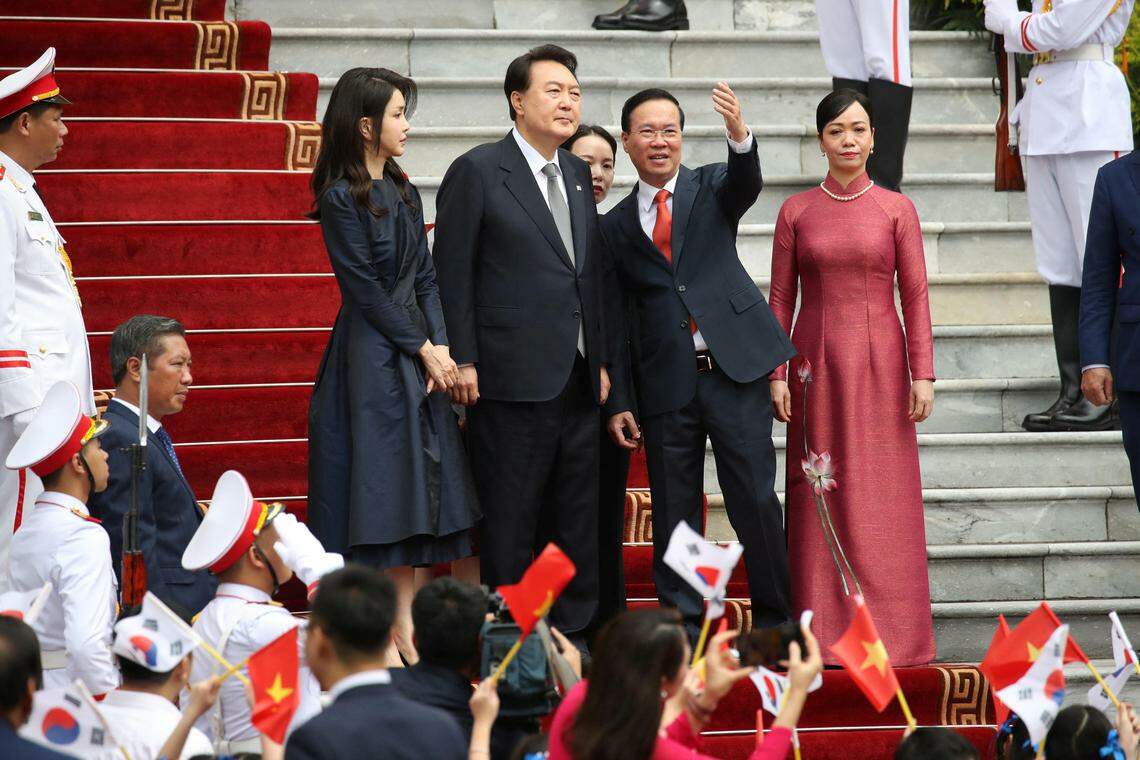
South Korea and Vietnam established diplomatic relations in 1992, when the bilateral trade volume was only 500 million US dollars.In 2015, the Korean Vietnam Free Trade Agreement took effect, and the economic and trade relations between the two countries accelerated.Former South Korean President Wen Zaiyin, who came to power in 2017, pushed the "New Southern Economic Policy" and strengthened cooperation with the Asianan country. Vietnam quickly became the main trade target of South Korea.
Han and Vietnam's economic and trade in 2022 reached 87.7 billion U.S. dollars, an increase of 175 times in 30 years.In 2022, Vietnam became the third largest trading partner in South Korea after China and the United States.At present, there are about 170,000 Korean people in Vietnam, the largest in Southeast Asia; nearly 230,000 people traveling in South Korea.
South Korea's trade surplus in Vietnam has also continued to increase, as high as US $ 34.2 billion in 2022, making Vietnam surpass China for the first time and become South Korea's largest trade surplus country.
South Korea is also the largest source of investment in Vietnam.As of 2022, South Korea's cumulative investment in Vietnam reached US $ 81 billion, leading to US $ 70.8 billion in Singapore.
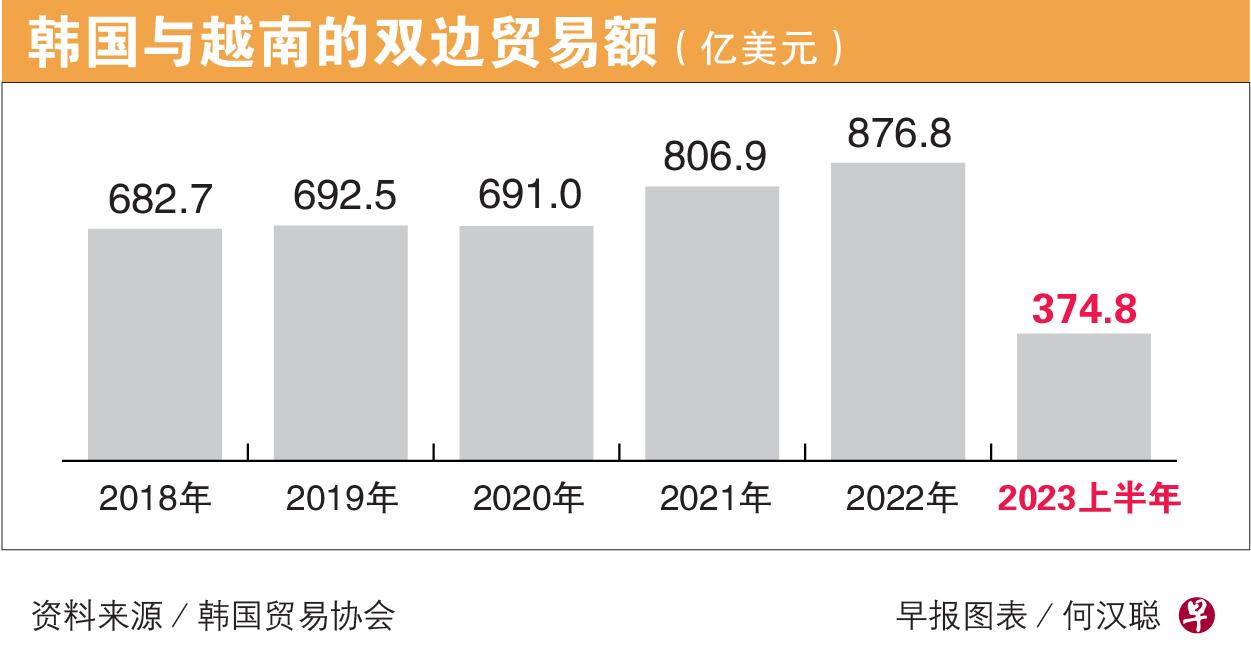
Samsung Electronics has produced mobile phones in North Ning and Taiyuan Provincial Factory in North Ning and Taiyuan Province since 2008. It also operates home appliance production facilities in Ho Chi Minh City.More than half of Samsung smartphones sold around the world are produced in Vietnam.So far, more than 8,800 Korean companies, including LG, Lotte, Xiaoxing, Hyundai and other large groups, have created 700,000 employment positions in Vietnam, and the output accounts for 30%of Vietnam's total exports.
South Korea's Institute of Industry Research published the 30th anniversary of the Han -Yuejian diplomatic relations and reports of the new cooperation direction report in December last year, stating that if China and the United States have intensified strategic competition, countries are likely to be forced to choose a border station."South Korea can join hands with the Asianan that belongs to Vietnam to deal with (this situation). Vietnam's strategic value is great."
After Yin Xiyue visited Vietnam, South Korean public opinion heatedly discussed that it was necessary to reduce economic dependence on China and turn to Vietnam for a breakthrough. It is a necessary choice for South Korea.
South Korea and North Korea Daily published an article on the title of "Vietnam's Progressive Based on China". After 30 years of establishing diplomatic relations between South Korea and Vietnam, it became an economic community, and Vietnam has become the core of the Sino -U.S.Production bases, major consumer markets and research and development bases.For example, Apple Corporation in the United States, Foxconn in Taiwan, and Danish toy companies Legao and other multinational companies have successively relocated the manufacturing base to Vietnam in recent years.
South Korea's Central Daily also said that "de -China" to avoid China's labor costs soaring and the competition in China and the United States, which seems to be the general trend.
It is reported that South Korea's exports to China have decreased for 13 consecutive months. Some people think that it is now "the best time to reduce dependence on China", and Southeast Asian countries such as Vietnam are required for South Korea to realize the diversified supply chain diversification.market.
The British Economist Economist refers to these markets as "Altasia".This new term is merged by Asia's "ASIA" with the "Alternative" that means "alternative". It is a collective name for 14 "Asian countries and regions that will replace China", including Japan, Taiwan, India, Vietnam, and Singapore.Essence
Economists believe that although the scale of these alternative markets is not comparable to China, as a general, the total export of Asia's replacement supply chain is not inferior to China, and it has begun to compete with China in specific fields.
The era of the era of exports to China to China
Kang Jirong, a professor at the Chinese Department of Chinese Studies University in Foreign Languages, told the United Morning Post that how to reduce its economic dependence on China is a problem that has been annoyed by South Korea for a long time.
Kang Jirong said that 80%of South Korea's exports to China are intermediate products, of which 30%are semiconductors.However, the self -sufficiency rate of Chinese middle products has been greatly improved now, and there is no need to import from South Korea.It is therefore necessary to open up other markets such as Vietnam and Indonesia.
According to data from the Ministry of Commerce Resources of the Korean Industry, in the first half of this year, South Korea's trade deficit with China has reached US $ 13.13 billion.But in 2018, South Korea's trade surplus to China reached 55.6 billion US dollars.In other words, in just five years, China has become the largest source of trade deficit from South Korea's largest source of trade surplus.
Cheng Taiyun, a professor at the Department of Economics of Yanshi University, analyzes the United Zaobao that structural issues such as cutting -edge technology, decreased competitiveness in South Korea, and changes in global supply chain are actively developing.decline.
A modern car employee who did not want to be named bluntly said in an interview: "Frankly, the era of exporting dividends in South Korea has come to an end. Modern Automobile Beijing Factory had to import about 80%of parts from South KoreaThe parts can be purchased in China. "
"To the snow to the snow is that the Chinese do not buy modern cars, but buy new energy cars made in China or imported luxury cars in Germany. Hyundai cars are embarrassing in the Chinese market."
Vietnamese production base is difficult to completely replace China
In order to reduce its dependence on the Chinese market, South Korea actively develops cooperation with Vietnam.Professor of Shi Shi University and President of the Trade Society Park Xi believes that the South Korean government is quite successful in this area.
He said in an interview with Lianhe Morning Post: "Vietnam is an important production base that can reduce excessive dependence on China in South Korea. At the same time, it is also a consumer market based on young generations who like Korean culture.Vietnam, one of the body, has a good strategic effect. "
However, the "Asian substitution supply chain" is still difficult to completely replace China.Although China's competitiveness has weakened in the past, it still has high -quality labor and perfect industrial infrastructure.Moreover, China is the largest market for semiconductors in the world, and South Korea cannot give up completely.
Kim Hengzhu, chief research committee member of Jingxiang News quoted the LG Operation Research Institute, reported that Chinese goods have always been very competitive in quality and price, and it is difficult to surpass the supply chain.Instead, it is aimed at reducing half, while seeking diversification of exports.
The editorial published by the Cultural Daily has also emphasized that the 30-year economic and trade relations of China and South Korea cannot be "decoupled" at once, and what to do should be "de-Risking".
Robert Engle, a winner of the Nobel Prize in Economics and Professor of New York University, was interviewed by South Korea when he visited South Korea on July 2: "Global supply chain reorganization will become the opportunity for South Korea to cause trouble.South Korea's exports to China will decrease, but the proportion of exports to Western countries will increase, which will help reduce dependence on China. The Korean economy is facing unprecedented challenges and needs to seize new opportunities. "
Vietnam becomes the largest source of international students in South Korea
South Korea's closer economic and trade cooperation with Vietnam has driven people between the two countries.Vietnam went to South Korea for the first time to surpass China earlier this year, becoming South Korea's largest source of international students.
According to data from the Ministry of Legal Affairs of the Ministry of Justice in Korea, as of the end of February 2023, the number of foreign students in South Korea reached 25,167.Among them, there were 70,212 students from Vietnam, the largest number, and 63,859 in China ranked second, followed by Uzbekistan and Mongolia in turn.
The increase in international students, in addition to the increasing efforts of Korean universities to attract foreign students, in response to the inadequate problems caused by factors such as domestic fertility rates, "Korean Wave" and the huge overseas investment in Korean companies have also played a significant role.
In the early 2000s, Korean dramas and K-POP "Korean streams" swept Vietnam, setting off a boom in Korean learning.Nowadays, large Korean companies such as Samsung and LG have invested in Vietnam for many years, and Korean companies will recruit Vietnamese employees who are proficient in Korean with two or three times salary, further pushing Vietnamese to learn Korean and studying in Korea.
Some Korean universities have begun to hold a study expo at Vietnam and invite students and parents to visit South Korea.
Chen Xiuying (23 years old), a Vietnamese student who went to South Korea four years ago, was a third -year student at the Global Business Department of Founding University of Seoul.She watched Korean dramas with her mother since she was a child, making her feel kind about Korean culture. When she was in high school, she decided to study in Korea because she liked the popular men's BTS (BTS).

She said: "Park Hengxu, the former Korean coach of the Vietnamese National Football Team, is very popular with the Vietnamese. Grandpa and parents who like football because he likes South Korea very much. When I expressed to my family the idea that I want to study in Korea, no oneOppose, support me. "
Chen Xiuying introduced that young people in Vietnam are now "han".Facebook group "Korea! Wait! I want to pass!", 443,000 members set up by the Facebook group of young people in Vietnam, reached 443,000 members;
She said: "After Samsung, LG and other Korean companies enter Vietnam, they only need to speak Korean, and the salary is more than 2 times more than ordinary Vietnamese people.(About 336 to 450 yuan), if you talk about Korean, you can get 15 million to 20 million Yuenan Shield. I hope to find a job in South Korea after graduating from college."
Although the price of Seoul is more expensive than Hanoi, but because the hourly salary is relatively high, Chen Xiuying believes that it can still cope.She said: "Seoul can earn 10,000 won per hour, you can buy a cup of coffee, but you can't afford a cup of coffee for an hour in Vietnam.
But she smiled and took out the BTS fan club membership certificate from the schoolbag and added: "The college tuition fee is a parent, but the living expenses must be made by herself.In order to buy BTS concert tickets or peripheral goods, it costs an average of 200,000 won, so you have to save money yourself. "
Li Qionghua (20 years old) who studied Korean at the Municipal University in February this year is also a Vietnamese student.She is not chasing stars when she is studying in Korea, but hopes to return to Vietnam to work in Korean companies or be a Korean teacher in the future.
She said: "My mother is a Korean translator, and my cousin also graduated from South Korea to graduate from a university. After seeing that they studied Korean back to Vietnam, they developed very well. I hope to be a person like them. Friends around my mother are almost almostThey all retired, but because the mother is proficient in Korean, not only can I continue to work, but also higher income than others. They are the role model I want to learn. "
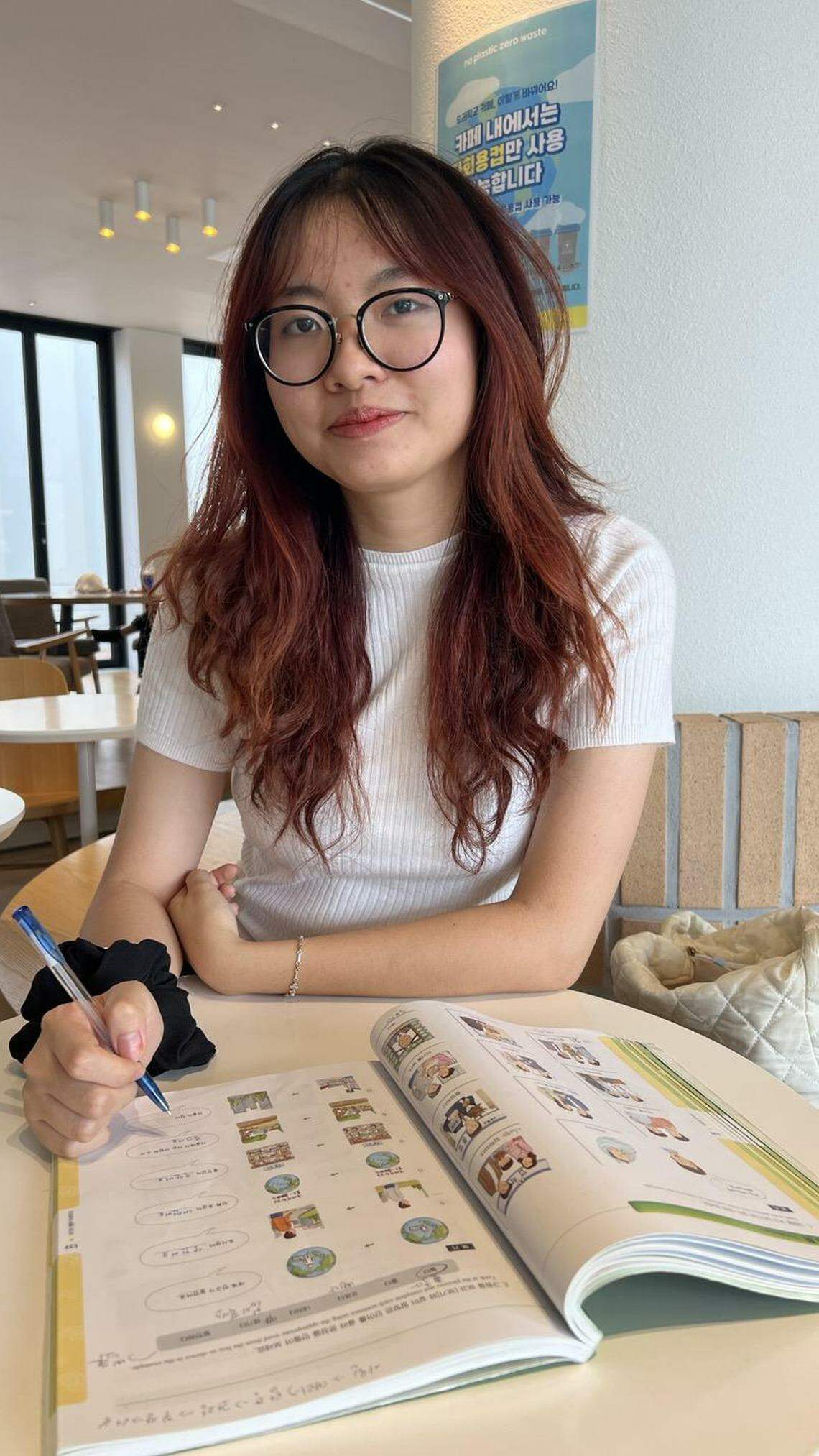
Li Qionghua's father is a professor at Hanoi University, and his mother works in Korean logistics companies in Hanoi.When she came to Seoul to study abroad, her parents spent a lot of money due to the agency fees and visas for studying abroad.Coupled with the high price of Seoul, Li Qionghua must be half -work and half -reading.
Li Qionghua's performance in the college is among the best.She said: "Now I go to Korean junior classes and work more when they are free. I may have time when preparing to take a college in the future. Save money when I have time now, so as to reduce the burden on my family."
Li Qionghua's mother Zhu Shiping (50 years old) revealed in an interview that she went to a textile company in Seoul 30 years ago as a trainee, and worked hard to improve her life after hard work."Vietnamese like to learn Korean. As long as they can speak fluent Korean, they can find a good job. I hope that after finishing college in South Korea, I will continue to be admitted to doctors and teach Korean in college after returning to Vietnam."
Primary Three can select more than 50,000 people in Vietnam to learn Korean
In addition to studying in South Korea, there are many Korean schools and courses in Vietnam.Vietnam selected Korean as a first foreign language in 2018 and included in the primary and secondary school curriculum system, allowing students to take the third grade from elementary school. It is the first case in the world.According to Yue Tong News Agency, there are more than 50,000 people in Vietnam in Vietnam, and there are nearly 60 colleges and universities that have opened Korean majors.
The Korean training institution "Sejong Academy", which is officially run by South Korea, has also increased from three schools in Vietnam to 23 in 2011. The total number of students has reached 580,000.


